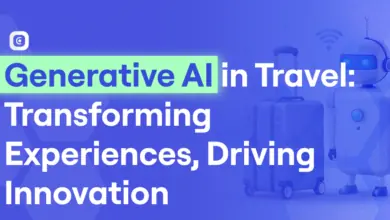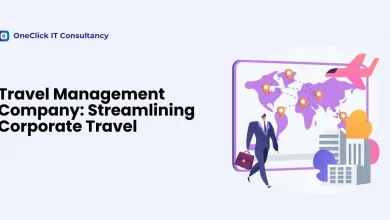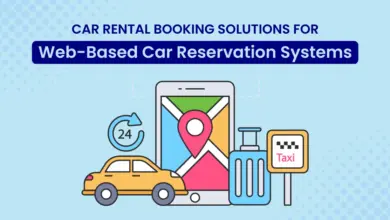How to Build an AI-Based Travel App
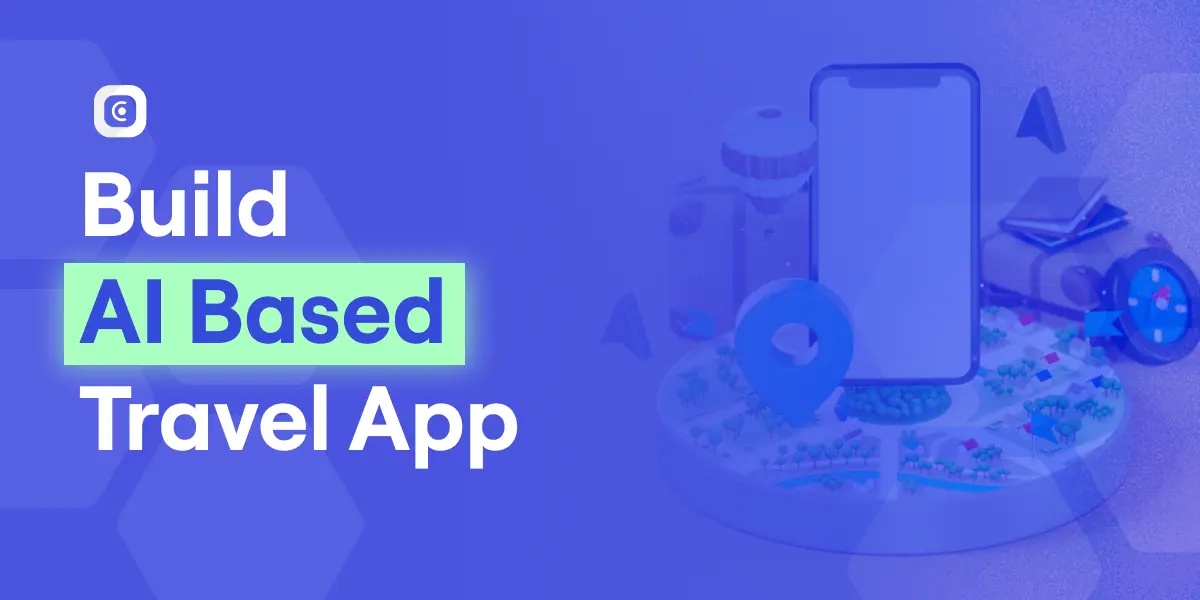
The AI revolution is influencing the travel market like never before. Modern-day customers do not engage with traditional business or corporate travel apps, they need something different to enhance their experience. But how can travel companies perfect the customer journey and make it memorable? Enter, AI-based travel apps, that can streamline this task in no time.
By utilizing the full potential of AI travel assistant apps, companies can not only enhance their operations but also provide a personalized experience to their customers. Whether you’re a travel startup, a tech visionary, or an enterprise aiming to launch the next big thing in the travel space, building an AI-based travel app is a move that promises innovation and customer loyalty.
In this blog, we’ll guide you through the entire process. From understanding what an AI travel assistant app really is, to exploring its must-have features, development steps, costs, challenges, and how to make your solution future-ready.
What is an AI-Driven Trip-Planning App & Why Build One?
Before getting started with anything too technical, let’s first understand the importance of building an AI-powered travel management app. An AI-powered trip planner app leverages artificial intelligence, machine learning, and natural language processing to offer travelers a seamless, personalized experience.
Think of it as your travel agent on steroids, capable of real-time updates, smart itinerary generation, voice-assisted planning, and data-driven decision-making. Here are a few scenarios discussing how AI travel apps work with data-driven logic, effective personalization, and seamless automation.
- AI-based travel apps are designed to carefully analyze the ongoing or upcoming trends indicating a demand surge. This particularly helps a diverse set of audiences who are looking for an opportunity to plan their next trip at the perfect time.
- Effectively allows businesses to cater to the needs of international customers with features like localization, multi-language support, and accepting payments in any currency.
- Travel AI apps save customers from the hassle of manually searching for the preferred services by generating automated, smart itineraries.
- The predictive algorithm of AI-powered travel apps helps to improve user satisfaction, resulting in a better satisfaction rate and improved repeat customers.
- AI travel assistant apps can make informed and smart suggestions by crunching live data like weather, prices, availability, etc.
Key Features of an AI-Based Trip Planner App
Now that you’ve understood the importance of AI-powered travel app development, let’s go through the essential features that are necessary to stand out from the competition.
1. Core Functional Features
User Profile Management
The travel planning AI app must be equipped with a quick dashboard that allows customers to access their profile to add a booking, journey, and travel preferences. From creating a profile to managing it for future use, every user should be able to access their records at a glance and potentially customize the app as desired.
Booking and Reservations
In this challenging market, your travel portal should not be limited to providing one module or service. With effective and popular travel API integration, you can build a unified platform that allows customers to book from multiple services like flights, cruises, hotels, activities, car rentals, and much more. This will make your travel solution a customer favorite in no time.
Search & Filter Functionalities
Enhance user experience by eliminating the need to manually look for a specific module from your AI travel app. Make the process simple by adding a quick search filter that allows the travellers to get results faster. This is a crucial addition for every travel app that will make things simpler for every user exponentially.
Payment Gateway
Travel companies should ensure that the payment gateways of their travel apps are secure and compliant with all industry standards like CCPA, GDPR, and PCI-DSS. This becomes very important for users who are wary of making online payments, afraid of possible scams. Your platform should be able to read all transactions, encrypt them, and authorize them securely.
Sustainability Mode
Now that a major chunk of travelers have become environmentally conscious, it’s better to offer suitable options for them. Simply put, integrating a new section devoted to eco-friendly options will attract a new set of customers who are actively looking for such platforms. This will ultimately improve your user base and customer relationships.
2. AI-Powered Functionalities
Smart Itinerary Generator
With the advent of AI, your customers should also be able to plan a perfect trip with minimum hassle. AI travel assistant apps can be enriched with features that help customers by suggesting a perfect itinerary based on their preferences and past booking data. This will not only save time but also enlighten travelers on the best places to visit.
Personalized Recommendations
While itineraries are a better option for travelers who do not have anything planned, recommendations work better who just seek assistance with something specific. Suppose a customer is unaware of the best flight options, and your platform swoops away the worries by recommending ideal airlines categorized according to the budget preferences. Amazing, right?
NLP Chatbots for 24/7 Support
Manually catering to customer queries will definitely leave your team overwhelmed and customers with a delayed response. But all this can be optimized with simple AI-chatbot integration. Users can not only get instant resolutions to their problems, but with the natural language processing (NLP) support, your platform will also be able to solve their other travel needs.
Hands-free Voice Assistant
Many travel solutions are trying something new with their portals to attract new customers. If you’re unaware of what to do in such a situation, then consider providing voice assistant support. By allowing users to book their entire journey by simply voice commands sounds very fascinating. And the best part is, travel technology companies like OneClick can help you with such specific requests.
Multi-language and Multi-currency Support
Make your travel solution ready-to-scale by enabling the users to access the solution in any preferred language. This will help you to target all the regions without any limitations and cater to international customers effectively. Additionally, you can enhance user experience by accepting payments via multiple modes like cards, crypto, net banking, wallets, etc.
3. Advanced Features
Predictive Travel Trends
Providing a personalized experience to customers is not as hard as it sounds. By leveraging the power of AI, business travel apps can understand user preferences, predict their needs, and provide tailored recommendations. Your AI travel planning app can also provide personalized itineraries and recommendations for activities and attractions.
Dynamic Pricing Alerts
For a unified platform, pricing alerts are crucial to the traveler’s journey. Your travel solution should be optimized for alerting users about fluctuating prices for all services and help them find the best deals. The alerts should be customizable, enabling users to add desired destinations, travel dates, and maximum price. With such triggers, you can potentially help your users save money.
Augmented Reality
Often, traveling to a new destination is a challenge for customers. Unaware of the place, they find it hard to make a prompt decision. With the help of augmented reality (AR) support, your travel solution can solve this problem by overlaying digital information onto the real world, providing interactive and immersive features.
Virtual Assistants
Last but not least, complement your services like never before with the help of a dedicated virtual assistant. This will help you provide a personalized and efficient traveling experience to your users at every step. From booking flights, hotels, and cruises to planning for visiting the best places around, your AI travel assistant app can become very handy for every user.

Traditional vs. AI-Powered Travel Apps
To better understand the impact that travel AI apps can create for your portal, here’s a quick comparison with the traditional methods.
| Feature | Traditional Travel App | AI-Powered Travel App |
| Itinerary Planning | Manual | Automated with AI |
| Personalization | Generic | Real-time & dynamic |
| Customer Support | Email/Call | 24/7 AI Chatbot |
| Booking Process | Step-by-step | Streamlined AI flow |
| Language Support | Limited | NLP & Translation |
4 Challenges While Implementing AI in Travel Apps
The influence of AI in travel solutions has a unique set of challenges that must be addressed to fulfill the customer’s needs with maximum precision. Here are some of the most nerve-wrecking problems with the perfect solution.
1. Ethical AI Considerations
If not paid attention to during travel mobile app development, AI can implement social biases, sometimes leading to discriminatory outcomes. To avoid this occurrence, ethical AI practices must be implemented to ensure fairness, transparency, and accountability in algorithms. This not only helps in protecting user privacy and data, but also refrains from any possible biases while making recommendations.
2. Data Security and Privacy
Remember, your AI travel app is accessing user data, with their permission, to make suitable and accurate suggestions. This automatically implies that your company is responsible for keeping the customer data safe at all times. Hence, make sure your solution adheres to all industry guidelines while complying with GDPR and CCPA regulations.
3. Inability to Understand Emotions & Nuances
What is the point of enriching the user experience with artificial intelligence if it cannot understand user commands properly? Despite being helpful, AI often lacks the emotional intelligence to deal with certain situations. Hence, ensure to train your AI model with effective NLP techniques to help the chatbot or virtual assistant understand the prompts properly.
4. Tech Dependence and Over-Automation
Travel companies need to remember the fact that AI is just a medium to improve user experience and streamline operations. Being entirely dependent on artificial intelligence will just make the system too robotic and less human-like. This situation should be avoided as it can build distrust among users and affect the ongoing operations.
Steps to Build an AI-Based Travel App
Below is the detailed breakdown of how to get started with building an AI-powered travel management app.
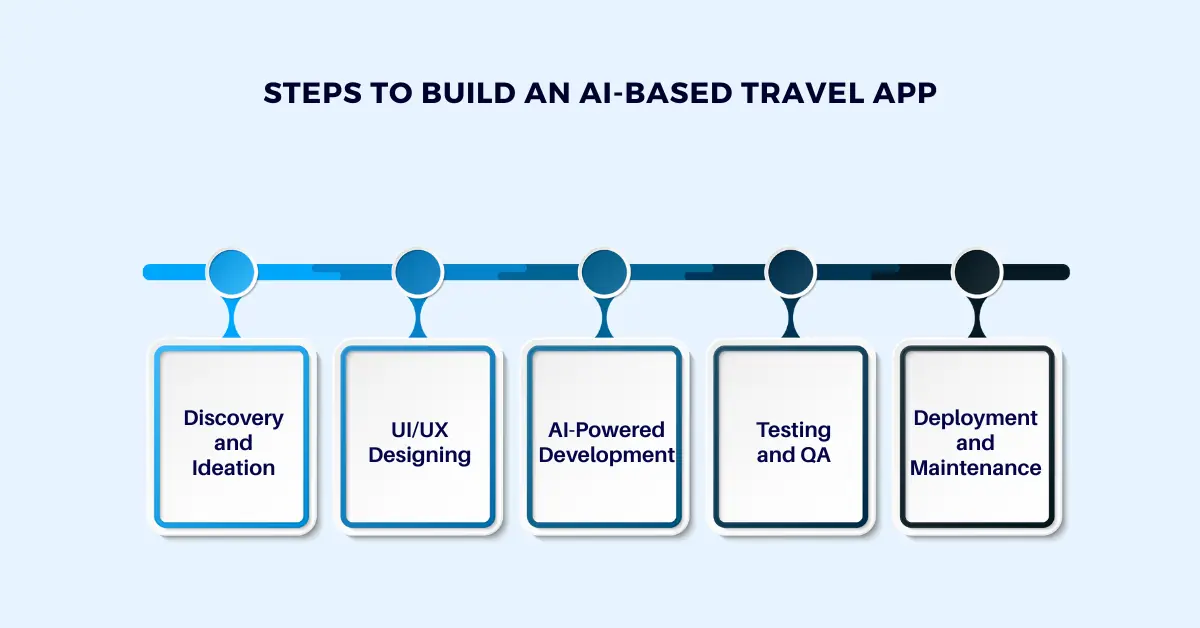
Step 1: Discovery and Ideation
The AI-based travel app development starts with extensive market research, where the use case of the solution is finalized and the user persona is built.
Step 2: UI/UX Designing
The next step is where magic happens. Here, the travel companies have to focus on providing a seamless, intuitive, and voice-friendly interface to their customers for an unmatched experience.
Step 3: AI-Powered Development
Once the solution is developed, it’s enriched with necessary AI and ML features like NLP, predictive analytics, and an itinerary builder. The AI models are meticulously trained to provide the best results.
Step 4: Testing and QA
Now that the AI travel agent app is developed, the next step is to make sure all the integrated automations are working as desired. To verify, manual testing is scheduled for NLP accuracy, personalization logic, etc.
Step 5: Deployment and Maintenance
After the AI-powered travel app is launched successfully, the platform should be regularly monitored to provide new version updates. What’s more, a feedback loop should be created to continue ongoing data training for further improvements.

Cost Distribution for AI Travel App Development
The infographic provided below represents the estimated breakdown of cost distribution for developing an AI travel assistant app from ideation to deployment.
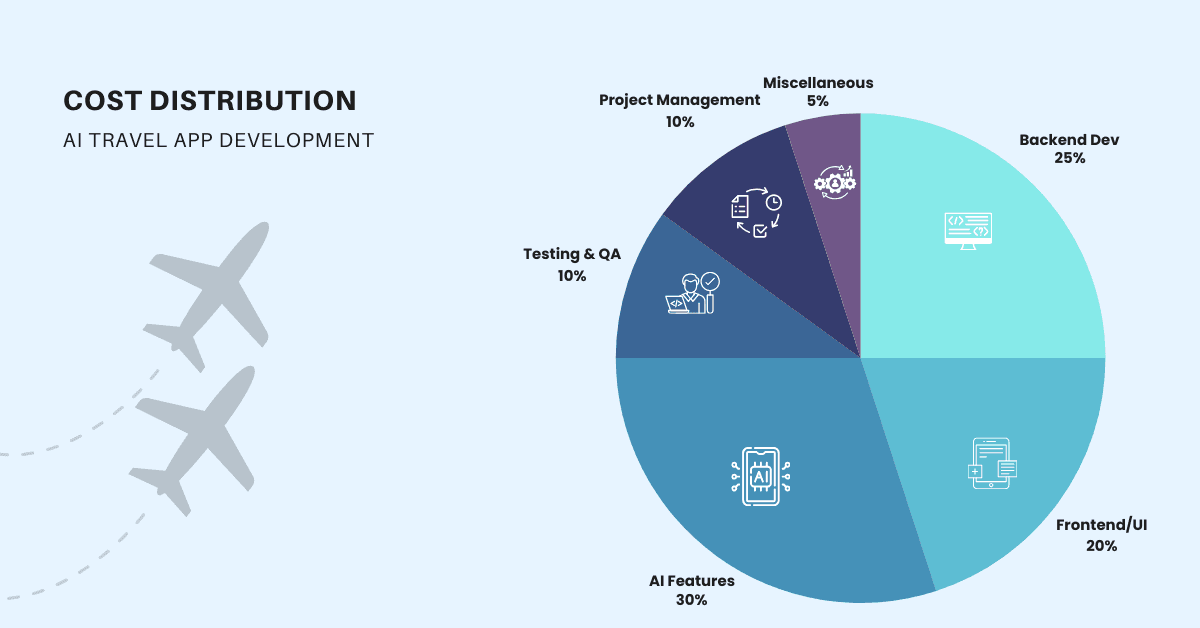
How OneClick Can Help You Build the Next Big AI-Powered Travel App
Building a feature-rich, intelligent, and scalable AI-powered travel app is no small feat. It requires not just technical prowess but also a deep understanding of user behavior, travel domain intricacies, and cutting-edge AI capabilities. This is where OneClick stands out as your strategic technology partner.
Proven Expertise in AI and Travel Tech
With more than 12 years of experience serving the travel industry, we understand the core concepts of AI and ML. Whether it is custom travel planners, custom flight booking engines, or corporate travel portals, our team of 200+ dedicated developers can ace it all.
Our agile methodology helps us develop solutions at a speed and precision that brings your vision to life with our cross-functional team of AI engineers, travel domain experts, and UX strategists. Whether you’re looking to create an:
- AI travel assistant app
- A business travel app
- A travel management platform
- Corporate travel app
- Or just scale your existing platform with AI capabilities
We have the domain-specific insights and tools to deliver.
Technologies That Power Next-Gen Travel Apps
OneClick leverages a powerful tech stack tailored for AI-based travel app development:
- AI & ML Frameworks: TensorFlow, PyTorch, OpenAI GPT, Hugging Face
- Natural Language Processing (NLP): Dialogflow, Rasa, Amazon Lex
- Recommendation Engines: Custom-built engines using collaborative and content-based filtering
- Real-time Data Integration: APIs for weather, maps, local activities, transport, and more
- Cloud & DevOps: AWS, Google Cloud, Docker, Kubernetes for scalable infrastructure
- Mobile Frameworks: React Native, Flutter, Swift, Kotlin
With this stack, we help you implement smart features like personalized trip suggestions, AI-based itinerary building, real-time fare predictions, language translation, and AI chatbots for a seamless user experience.

The Road Ahead: Build Smarter, Travel Better with AI
AI has become a new front for travel businesses to showcase their expertise and attract new customers by providing a variety of features and seamless experiences. With AI travel planning on the rise, many competitors will try to make the most of their goals. Simply put, travel companies that refuse to adopt the future trends will be left behind. So don’t take this chance and join hands with OneClick, as we can help you ride this wave better than anyone else.
FAQs
The entire cost of developing a travel app powered by AI is influenced by multiple factors like the targeted region (US, India, Eastern Europe), the tech stack, and feature complexity. Companies can expect an overall estimate range from $20,000 to $150,000.
Yes, some features, like saved itineraries and downloaded maps, can work offline, but real-time AI insights require connectivity.
Not at all. Corporate travel apps and business travel management platforms benefit greatly from AI optimization too.
Yes, modular AI components (like NLP chatbots, recommendation engines) can be integrated with legacy systems.
Yes, AI can suggest eco-friendly accommodations, transport modes, and carbon offsetting options.


